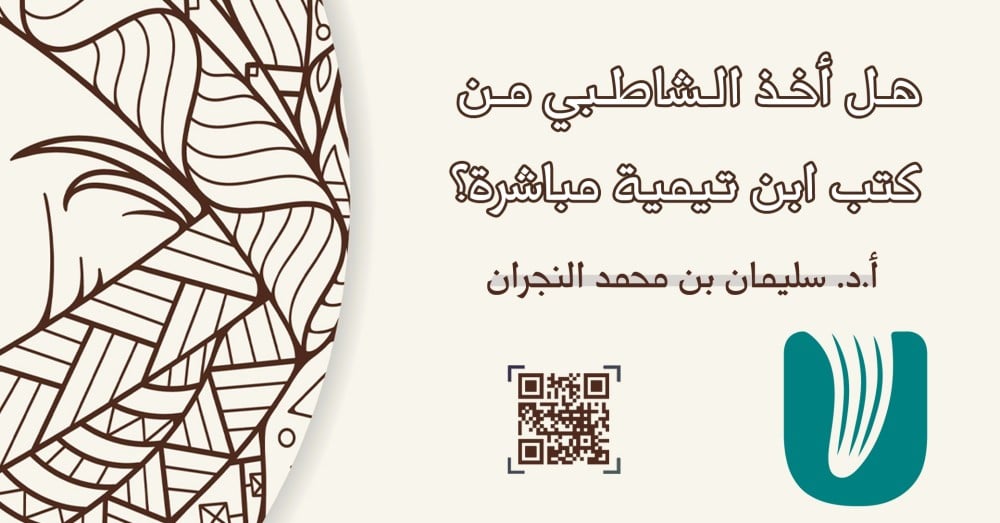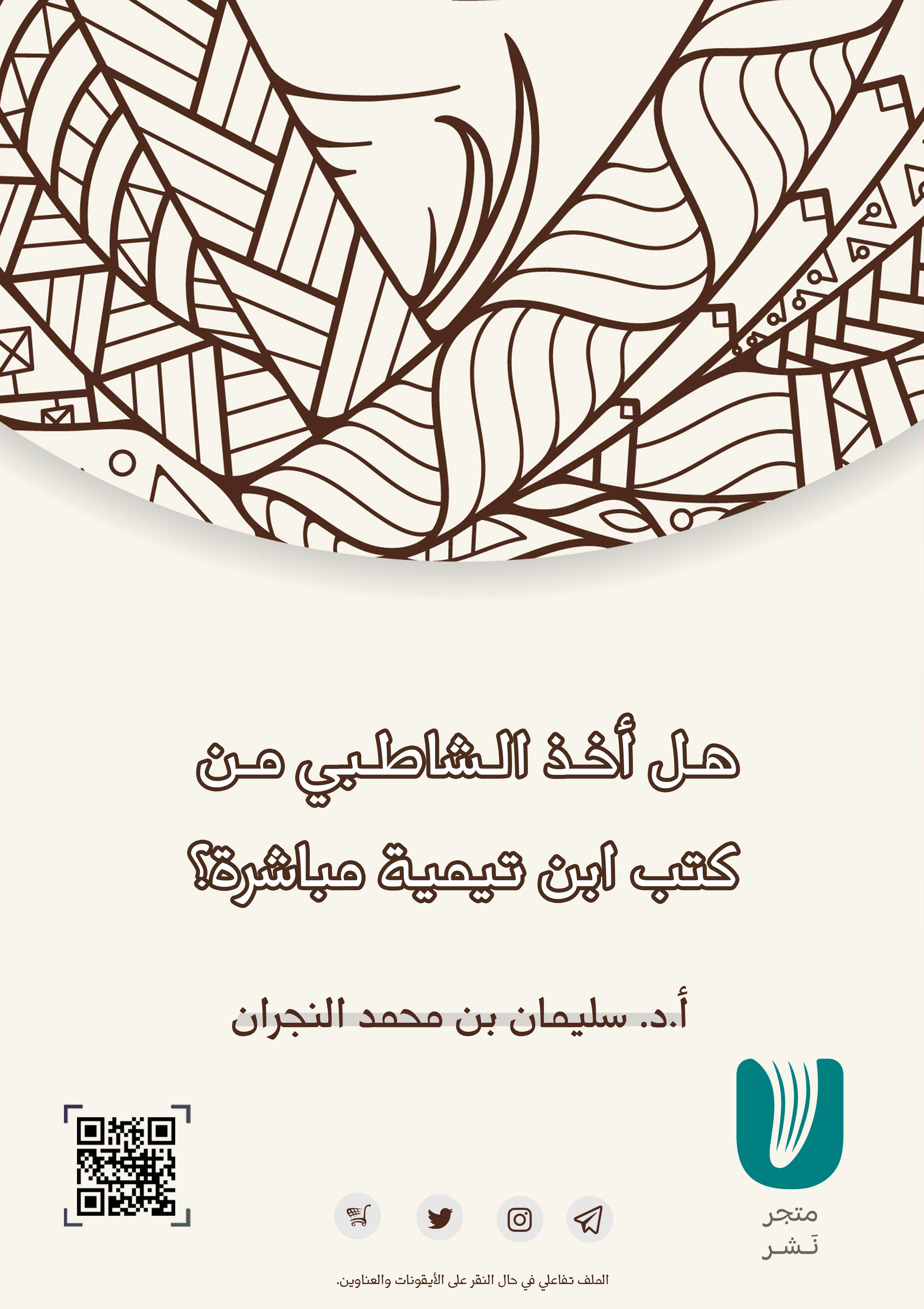Did Al-Shatibi take directly from the books of Ibn Taymiyyah, may God have mercy on him?
Mr. Dr. Suleiman bin Muhammad Al-Najran
At the time of Ibn Taymiyyah’s death, Al-Shatibi was about eight years old, or a little more, according to the dispute over Al-Shatibi’s birth. Al-Shatibi is a Moroccan who never traveled to the East, and Ibn Taymiyyah is a Levantine who never traveled to the West. The time period is possible for the transfer of Ibn Taymiyyah’s books from the East to the Morocco. Did Al-Shatibi benefit directly from Ibn Taymiyyah’s books? This is possible, especially since Al-Shatibi always requires high sources, high references, clarity of vision, maturity of thought, and strength of argument with proof, and this is what was apparent and originally, in the writings of Ibn Taymiyyah, may God have mercy on him, which means that it is an area of demand and a site of consideration for Al-Shatibi.
Initially, the hypothesis that Al-Shatibi benefited directly from Ibn Taymiyyah’s books was a matter of disagreement among contemporaries. When Sheikh Mashhour ruled out in his investigation of the approvals that Al-Shatibi took directly from Ibn Taymiyyah from his books, he said: “We can state with all certainty that Ibn Taymiyyah and Ibn al-Qayyim were not mentioned at all in all of Al-Shatibi’s printed books, and I have not yet succeeded in intense research and extensive investigation.” To what extent can we make this meeting established, or de facto, and I did not find a mention of the Hanbalis in his book by Al-Shatibi, and he stated in it (3/131) that the books of the Hanafi and Shafi’i schools did not exist in their time, so what about the books of the Hanbalis ? He said: “From the above, I rule out the validity of what Saad Muhammad Al-Shennawi argued in his book (The extent of the need to adopt the theory of mursal interests in Islamic jurisprudence) (1/150) when he spoke about Al-Shatibi being influenced by those who preceded him. He said the following: “Imam Al-Shatibi was influenced As stated in the writings of those who preceded him, namely Al-Izz bin Abdul Salam, Ibn Taymiyyah, Ibn Al-Qayyim, and Al-Qarafi, and for this reason we find his book a mixture and analysis of these valuable opinions in whose minds the theory of mursal interests was settled... I asked our Sheikh Al-Albani - may God protect him - about this issue. He replied that it was not proven to him and he had not seen anything that would allow for certainty or the possibility that the encounter took place between Al-Shatibi, Ibn Taymiyyah, or Ibn Al-Qayyim ” [1] .
This sheikh is famous, and before him, Sheikh Al-Albani - as it was reported from him - both of them ruled out Al-Shatibi benefiting directly from the books of Ibn Taymiyyah, and Sheikh Dr. Ahmed Al-Raysuni joined them, and he said in his response in the words of the lawyer Al-Shennawi: “I found Al-Shatibi - once - saying: ( Some of the Hanbalis said, “This is with regard to claims of consensus that are not proven, and some of them use it to block the way for research and discussion of some matters for which consensus is claimed and there is no consensus. However, I am unlikely that Al-Shatibi took this from a Hanbali author directly. What is even more unlikely is that He may have read some of the works of Ibn Taymiyyah or Ibn al-Qayyim, especially since he is not one of the authors of Oriental travel, as is the case with Ibn al-Arabi and al-Tartushi, for example, from whom al-Shatibi quotes a lot, and as is the case with his sheikh Abu Abdullah al-Muqri, who said about himself that: ( He met Shams al-Din Ibn al-Qayyim al-Jawziyya, the companion of the jurist Ibn Taymiyyah, in Damascus, but all of this does not help anything in proving the case of Dr. al-Shennawi, the lawyer, or even in “raising the case before the court” [2] .
So we have three: Sheikh Al-Albani, may God have mercy on him, Sheikh Mashhour, and Sheikh Dr. Al-Raysuni. They denied Al-Shatibi’s direct benefit from Ibn Taymiyyah’s books, as well as the investigator of the approvals, Dr. Al-Hussein Ayatollah Saeed, who did not declare any denial or proof.
Three others disagreed with them: lawyer Dr. Saad bin Muhammad Al-Shennawi, who preceded them in doing so, Sheikh Dr. Bakr Abu Zaid, may God have mercy on him, and Dr. Youssef Al-Badawi. They decided that Al-Shatibi benefited directly from Ibn Taymiyyah’s books.
Sheikh Dr. Bakr Abu Zaid, may God have mercy on him, said: “This is a contemporary glimpse of this imam - meaning Al-Shatibi - in his scientific and practical life, and contemplating it clearly shows his renewal tendency and his reformist call - like every innovator and reformer - and it is very similar to the call for renewal that he carried out.” In the East, Sheikh al-Islam Ibn Taymiyyah - may God Almighty have mercy on him - even though his homeland was far apart, and the birth of this imam after the death of Sheikh al-Islam, and each of them never left to the other’s country, but I found traces of knowledge indicating that Sheikh al-Islam Ibn Taymiyyah had a voice heard in Granada. This is because Imam Al-Shatibi was quoted in Al-I’tisam (1/356) as saying: (Some Hanbalis said...) and it is stated in Ibn Taymiyyah’s book: (Establishing Evidence for the Invalidity of Analysis) printed in: Al-Fatawa Al-Kubra (3/370), and perhaps that Al-Shatibi - may God have mercy on him - did not name him, nor did he go on mentioning him and quoting him, out of fear of the enmity and alienation that occurred among the Khulaf .” [3]
After Sheikh Bakr Abu Zaid, Dr. Yusuf Al-Badawi learned that Al-Shatibi benefited from Ibn Taymiyyah, so he mentioned eight pieces of evidence that prove this. In some of them, he cited Al-Shatibi’s statements in text from the words of Ibn Taymiyyah in his book: (Statement of the Evidence for the Invalidation of Analysis), and in some of them there is a correspondence of words and phrases, and a similarity in the evidence on the same issue. Al-Shatibi benefited from this book by Ibn Taymiyyah, and perhaps he benefited from other books by Ibn Taymiyyah, and it is known that Sheikh Al-Shatibi Abu Abdullah Al-Muqri (d. 759 AH) met Ibn al-Qayyim, and was a contemporary of him, and it is possible that he carried a number of Ibn Taymiyyah’s books to Andalusia. Al-Shatibi benefited from it. [4]
As for Sheikh Mashhour, he retracted what he decided in the approvals, which was denying that Al-Shatibi benefited directly from Ibn Taymiyyah’s books. He cited eleven pieces of evidence for Al-Shatibi’s benefit from Ibn Taymiyyah, some of which are quotes in the text from the book: (Bayan Al-Dalil) by Ibn Taymiyyah, some of them in meaning, and some of them verbal and inferential agreement and correspondence, and they are similar to what Dr. Yusuf Al-Badawi mentioned [5] , then Sheikh Mashhour wrote A research entitled: (Al-Shatibi is one of the good deeds of Ibn Taymiyyah’s school) [6] , in which he states what he reached here.
But describing Sheikh Mashhour Al-Shatibi as one of Ibn Taymiyyah’s good deeds is an obvious exaggeration. Al-Shatibi is a diligent imam in the principles of jurisprudence. His approach to determining and establishing evidence was not like that of Ibn Taymiyyah. Although they agree in many conclusions, their premises differ in constructing the principles. Each of their imams has an independent approach, and then Al-Shatibi, with all his legacy, long knowledge, and intense intellectual effort, is no longer described as being one of Ibn Taymiyyah’s results.
If it is proven that Al-Shatibi sipped from Moin Ibn Taymiyyah; This indicates the superiority of Al-Shatibi’s research sources. Ibn Taymiyyah’s books, despite their spatial distance from him, required an excuse on the one hand, and despite his time being so close to him, and usually in that time books did not arrive easily. This is another aspect, and despite the fact that Ibn Taymiyyah had well-known positions with the Ash’aris and Sufis, and most of Andalusia was Ash’ari, they had Sufism, which makes people’s incitement against him possible. This is a third party; Despite all these obstacles combined, Al-Shatibi overcame them and benefited from Ibn Taymiyyah’s knowledge with great skill, wisdom, and accuracy, or he left in his books what he saw as the truth, without provocation, disturbance, or strife.
ــــــــــــــــــــــــــــــــــــــــــــــــــــــــــــــــــــــــــــــــــــــــــــــ
[1] Sheikh Mashhour’s Introduction to Al-Muwafaqat 1/78
[2] The Theory of Objectives by Al-Shatibi, p. 305
[3] The theory of objectives according to Imam Al-Shatibi, p. 305
[4] See: Objectives of Sharia according to Ibn Taymah, pp. 505-p. 517. Dr. Youssef Al-Badawi. See also a study entitled: A study on contemporary discussions related to the hypothesis that Al-Shatibi benefited from Ibn Taymiyyah, by the researcher: Sondos Abu Nasser, a doctoral student, Sakarya University, who approved the results reached by Dr.: Youssef Al-Badawi.
[5] See: Introduction to Tahqiq al-I’tisam by Sheikh Mashhour (1/9-80).
[6] The research was published in Al-Asala Magazine, No. 27.
Click here to access the full book page.
Click on the image to access the image version (pdf), which can be downloaded and published.


